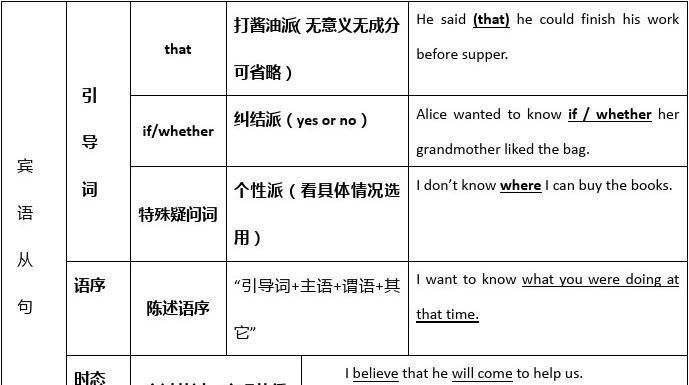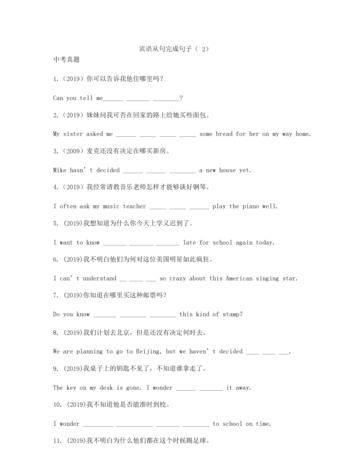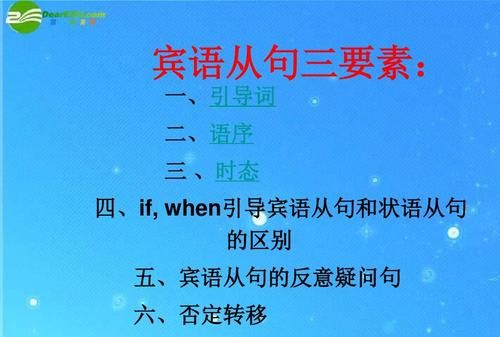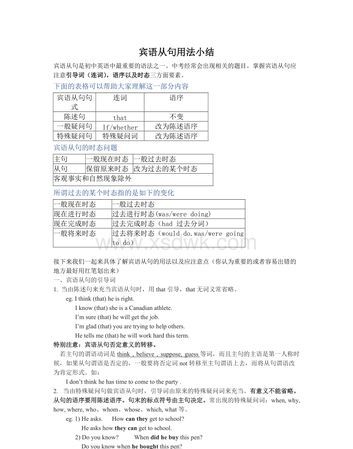本文目录
初中英语语法宾语从句ppt
宾语从句是在从句中充当宾语的从句叫做宾语从句,下面就是我给大家带来的中考英语语法专题详解十二:宾语从句,希望能帮助到大家!
考点聚焦
一、什么是宾语从句
在句中充当宾语的从句叫作宾语从句,宾语从句可作谓语动词的宾语,也可作介词的宾语。
二、宾语从句的引导词
1、 that 无实意,用来引导陈述句的宾语从句,口语中常省略。例如:
She told me that she had been to Hong Kong twice.
她告诉我她去过香港两次。
I know(that)the visitors are from Australia.我知道这些游客来自澳大利亚。
2、if或whether这两个词是“是否”的意思,主要用来引导一般疑问句或选择问句的宾语从句,口语中多用if,不能省略。例如:
He asked me if / whether I had been to Beijing twice.
他问我是否去过北京两次。
She wanted to know whether I would go there or not.
她想知道我是否想去那里。
3、疑问词when ,where,who,how等,这类词通常引导特殊疑问句的宾语从句。例如:
Can you tell me how I can find Mr Wang?
你能告诉我怎样才能找到王先生吗?
Please find out who broke the window.请查一下是谁打烂窗户的。
三、宾语从句的语序
凡是从句都必须使用“主语在前,谓语在后”的陈述语序,宾语从句也不例外,也就是说宾语从句的语序必须是“引导词+主语+谓语+ 其它 ”。例如:
误:Could you tell me where is the bus station?
正:Could you tell me where the bus station is?
四、宾语从句的时态一致
1、 当主句为一般现在时或一般将来时的时候,从句可以根据需要选择相应的时态,不受主句的影响;主句为一般过去时,从句要用相应的过去时态。例如:
I want to know what time he ate his breakfast.
我想知道他今天早晨几点钟吃早饭的。
They will tell us that they have been able to look after themselves.
他们将会告诉我们他们已经能照顾自己了。
I asked what my father was doing then.
我问那时我爸爸在干什么?
2、 当宾语从句表述的是客观真理或自然现象是,宾语从句的时态不受主句的时态的影响,仍然用一般现在时。如:
He said the moon moves round the earth.
他说月亮围着地球转。
She asked whether light travels faster than sound.
她问光速是否比声速快。
五、宾语从句的简化
由特殊疑问词引导的宾语从句中的主语与主句的主语或宾语相同时常常可以将宾语从句简化成“特殊疑问词+动词不定式”这种结构。有时候由that引导的宾语从句也可以用动词不定式或者动词的ing形式来简化。如:
Can you tell me how I can get to the post office?
= Can you tell me how to get to the post office?
She don’t know whether she should go there with them or not.
= She don’t know whether to go there with them or not.
He can remember that he has climbed the tall tree.
= He can remember climbing the tall tree.
六、宾语从句的否定转移及其它
1、当I think/believe/guess等一些看法的词后面所接的宾语从句是否定句时,习惯上否定主句,采用“I don’t think/believe/guess+肯定形式的宾语从句”这种结构来表达。如:
我认为明天她不会来。
误:I think that she won’t come tomorrow.
正:I don’t think that she will come tomorrow.
2、 对I think/believe/guess等动词后面所接的宾语从句进行划线部分提问时,要用“疑问词+do you think /believe/guess+宾语从句的剩余成分?”这种结构来表达。如:
你认为谁将在会上发言?
误:Do you think who will speak at the meeting?
正:Who do you think will speak at the meeting?

宾语从句短文填空
My teacher
My teacher is a beautiful young lady whom we all like very much. In the very first class, she told us that she just graduated from the university and asked us to treat her like a big sister. Yes, she does like our sister with whom we have a lot of fun: instead of hearing "Open your books and turn to page... ", what we do in class is learning from her interesting stories or enjoying funny games, turning the classroom into a playground; she also takes us outside and help us to recognize flowers and insects. Don´t think that it is a waste of time! In fact, to compare with boring letters written on books, getting knowledge from games and outdoor activities is more attractive for us. She is a cool teacher and I hope she can teach us forever

英语宾语从句近五年的中考题
Ⅰ.单项选择
1. He asked ________ for the computer.
A. did I pay how much B. I paid how much
C. how much did I pay D. how much I paid
2. “Have you seen the film?” he asked me. →He asked me _______.
A. had I seen the film B. have I seen the film
C. if I have seen the film D. whether I had seen the film
3. “Please close the window,” he said to me.
→He ______ me _____ the window.
A. said to; to close B. told to; closing
C. asked ; to close D. said to; please close
4. “I am a teacher,” Jack said. →He said _________.
A. that I am a teacher B. I was a teacher
C. that he is a teacher D. he was a teacher
5. He said, “Mother, the boy is very naughty.” →He _____- very naughty.
A. said his mother that the boy was
B. said to his mother that the boy is
C. told his mother that the boy was
D. spoke to his mother that the boy was
6. “You’ve already got well, haven’t you?” she asked.
→She asked ________.
A. if I have already got well, hadn’t you
B. whether I had already got well
C. have I already got well D. had I already got well.
7. He asked , “ Are you a Party member or a League member?”
→He asked me _________.
A. am I a Party member or a League member
B. was I a Party member or a League member
C. if I was a Party member or a League member
D. whether was I a Party member or a League member.
8. He asked, “How are you getting along?” →He asked _______.
A. how am I getting along
B. how are you getting along
C. how I was getting along
D. how was I getting along
9. He asked me ________ with me.
A. what the matter is B. what the mater was
C. what’s the matter D. what was the matter
10. He said, “Don’t do that again.” He _____ me _______ that again.
A. said to me; not to do B. said to me; don’t do
C. told me; don’t do D. told me; not to do
11.He asked me _____told me the accident.
A whom B which C who D whose
12.They don't know ______their parents are.
A that B what C why D which
13.Please tell me ______what last year.
A.where does your sister work B where did your sister work
C where your sister works D where your sister worked
14.She asked me if I knew ______.
A. whose pen is it B. whose pen it was
C. whose pen it is D. whose pen was it
15. You must remember ________.
A. what your mother said B. what did your mother say
C. your mother said what D. what has your mother said
16. Did you know ____?
A. who he was looking after B. who was he looking for
C. who he is looking for D. who he is looking after
17. Could you tell me ___?
A. when will they leave Beijing B. when would they leave Beijing
C. when they will leave Beijing D. when did they leave Beijing
附答案:
1. D 宾语从句要用陈述句语序。
2. D 一般疑问句要变成whether或if引导的宾语从句.
3. C 直接引语为祈使句, 变间接引语时, 主句中的谓语动词往往根据直接引语的口气换用ask (请求), tell (告诉), order (命令), invite (邀请), warn (警告), advise (建议)等, 而直接引语中的谓语动词要变成动词不等式。即ask/tell/order/invite/warn/advise sb. (not) to do sth.
4. D直接引语为陈述句, 变间接引语时用that引导(口语中常省略)。
5. C
6. B反意疑问句要变成whether或if引导的宾语从句。
7. C 选择疑问句要变成whether或if引导的宾语从句。
8. C直接引语为特殊疑问句, 变间接引语时, 用特殊疑问词引导, 并将疑问句语序变为陈述句语序。
9. D注意时态的一致。What作主语,the matter(=wrong)作表语。
10. D直接引语为祈使句, 变间接引语时, 主句中的谓语动词往往根据直接引语的口气换用。
11. C 引导词在从句中作主语,指人,只能用who 或 that
12. D 引导词在从句中作表语,可用that或which,但是父母是两个人,that要用those形式,没有,故选D
13.D 要用陈述语序,且last year 表过去时
14.B 用陈述语序,且主过从过
15.A 固定用法
16.A 理由同14题
17.C 用陈述语序 could表委婉而不是过去。
二.将所给直接引语变为间接引语,每空一词:
1. “I never eat meat.” he said.
He said that ______ never ______ meat.
2. “I’ve found my wallet.” he said to me.
He ______ me that he ______ ______ ______ wallet.
3. “I took it home with me.” she said.
She said that ______ ______ _______ it home with her.
4. The teacher said, “The sun rises in the east and goes down in the west.”
The teacher said that the sun ______ in the east and ______ down in the west.
5. “I met her yesterday.” he said to me.
He ______ me that he ______ met the day ______.
6. “You must come here before five.” he said.
He said that I ______ to go ______ before five.
7. “I bought the house 10 years ago.” he said.
He said that he _______ bought the house 10 years _______.
8. “Did you see her last week?” he said.
He ______ ______ I had seen her the week _______.
9. He said, “You can sit here, Jim.”
He ______ Jim that he ______ sit there
10. He asked, “How did you find it, mother?”
He asked her mother ______ ______ ______ found it.
11. “Where have you been these days?” he asked.
He asked me _______ _______ _______been _______ days.
12. “Do you know where she lives?” he asked.
He asked ______ ______ knew where she ______.
13. “Stop making so much noise, children.” he said.
He ______ the children ______ ______ making so much noise.
14. “Don’t tell him the news.” she said.
She told me _______ ______ ______ him the news.
15. “Are you intested in this?” he said.
He ______ ______ I was interestd in ______.
【参考答案】
1. he, ate 2. told, had, found, his
3. she, had, taken 4. rise, goes
5. told, had, before 6. had, there
7. had, before 8. asked, if [whether], before
9. told, could 10. how, she, had
11. where, I, had, those 12. if [whether], I, lived
13. told, to, stop 14. not, to, tell
15. asked, if [whether], that

英语带宾语从句的短文
My mother always wants to know what I plan to do if I say I want to go outside alone. My friends think my mother is too strict to me. I know my mother cares about me.

以上就是关于宾语从句较多的短文中考 ,初中英语语法宾语从句ppt的全部内容,以及宾语从句较多的短文中考 的相关内容,希望能够帮到您。

